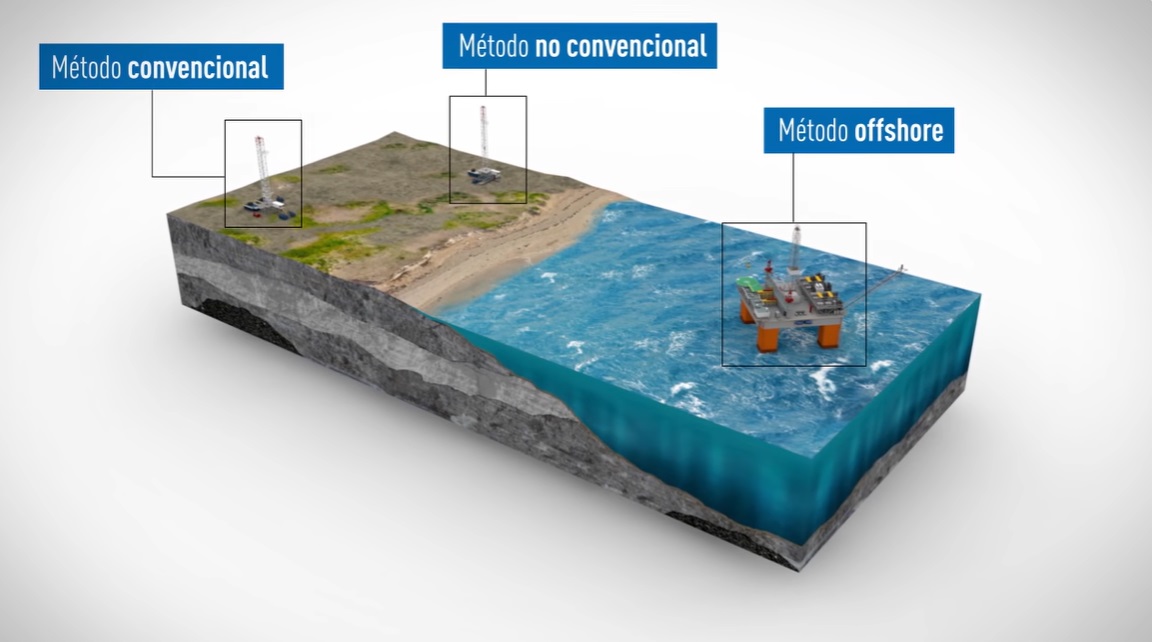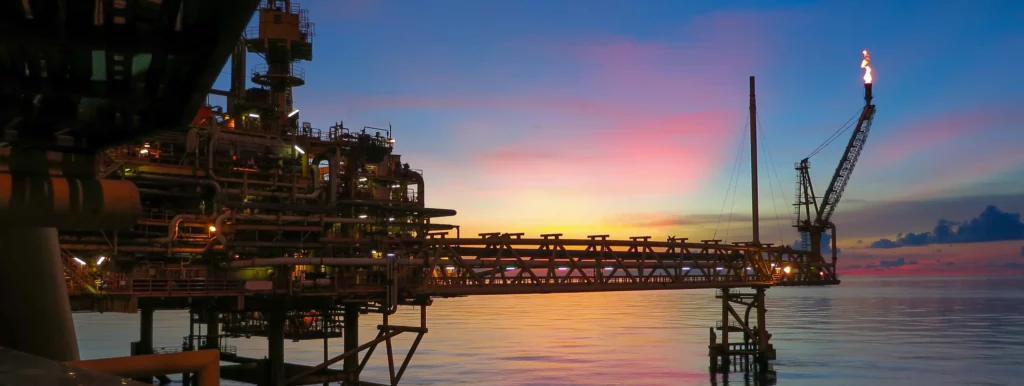In the oil and gas industry, the term ” upstream ” refers to the initial stages of the hydrocarbon production cycle, which encompasses the exploration, drilling and extraction of oil and natural gas. This sector is presented as the fundamental pillar, from the identification of deposits to the strategic drilling of wells and the recovery of crude oil from the subsoil.
This article addresses the upstream sector, where reliability optimization emerges as a decisive factor in ensuring sustainable efficiency and productivity.
This segment is located at the far end of the hydrocarbon supply chain from the final consumer, and is followed by the “midstream” (crude oil transportation) and “downstream” (refining and distribution) phases 1 .
“Upstream” activities include conducting geological surveys and obtaining exploration rights in onshore and offshore areas to identify potential locations for hydrocarbon drilling and extraction. Exploration and production companies involved in operations are dedicated to identifying and evaluating deposits, drilling wells, and recovering subsurface resources.
Relevance of exploration and production operations
In the energy industry, upstream operations play a fundamental role, marking the beginning of the hydrocarbon value chain. The importance of these operations lies in identifying deposits rich in energy resources, laying the foundation for subsequent exploration. Drilling wells, which lie deep in the earth. Furthermore, the effective recovery of raw materials from the subsurface sets the stage for the upstream cycle that fuels a variety of industries and economic sectors.
Precision at this stage is paramount as it lays the foundation for future development. The use of seismic methods, directional drilling and other innovative techniques allows the energy industry to understand the underlying geology and estimate the feasibility of extraction.
There are three types of oil and gas extraction methods. Conventional extraction, unconventional extraction and offshore extraction. The following video shows what each one consists of:

Video courtesy of YouTube. Source: YPF
Once a deposit is discovered, the development phase comes into play. Highly trained engineers design and execute strategies for the efficient extraction of resources. Optimization at this stage, fluid management and the implementation of cutting-edge technologies are essential to maximize efficiency and profitability.
Once the deposits have been identified, this phase begins. Engineering comes into action to design efficient systems that allow the responsible extraction of resources. The implementation of advanced technologies, such as directional drilling and enhanced oil recovery, seeks to not only maximize, but also minimize environmental impact. Sustainability and social responsibility are fundamental pillars in this phase, promoting practices that respect the natural environment.
Companies operating in the upstream segment
Companies operating in this sector may be involved in all phases of the oil and gas industry life cycle, or may specialize in a specific part of the sector.
The exploration and production stage constitutes the first part of the oil and gas generation process. Companies in this segment focus mainly on the location and extraction of raw materials from the subsoil, by searching for hydrocarbons through topographic studies to identify areas with the greatest potential.

The goal is to locate specific minerals underground to estimate the amount of oil and gas reserves before drilling. Geologists study rock formations and layers of sediment within the ground to identify whether oil or natural gas is present 2 .
Major international companies that have historically had a significant presence in the upstream sector of the energy industry include:
- ExxonMobil:
- Exploration: This company has participated in projects in various regions of the world, using advanced technologies to identify and evaluate hydrocarbon deposits.
- Production: It is involved in obtaining oil and natural gas, using advanced engineering practices to maximize efficiency and resource recovery.
- Royal Dutch Shell:
- Technological innovation: Shell has been a leader in implementing innovative technologies, such as enhanced oil recovery and digitalization of operations to optimize and reduce costs.
- Sustainable Development: It has invested in sustainability, renewable energy and low-carbon technologies.
- Chevron Corporation:
- International Operations: Has been involved in upstream operations globally, from deep water to production on offshore platforms.
- Advanced technologies: The company has invested in advanced technologies, such as 4D seismic, to improve accuracy in reservoir identification and evaluation.
- BP (British Petroleum):
- Energy transition: BP has expressed a commitment to the energy transition, exploring investments in renewable energy and reducing dependence on fossil fuels.
- Exploration and development: The company has been involved in the development of oil and gas projects in various parts of the world.
- TotalEnergies:
- Energy diversification: TotalEnergies has diversified its energy portfolio, investing in renewable energy sources and low-emission technologies.
- Offshore operations: The company has been active in offshore operations, particularly deepwater projects.
These companies are not only involved in exploration and production, but are also constantly innovating and adapting to meet the challenges of the sector, including sustainable resource management and the transition to cleaner energy sources.
The decisive role of reliability
In this dynamic and challenging context, reliability rises as the critical factor driving the success of upstream operations. Reliability optimization is not simply a goal; It is an essential requirement to ensure that each stage, from initial identification to final recovery, occurs efficiently and productively. The consequences of any failure or delay in this phase reverberate throughout the entire chain, affecting not only production, but also the economy and energy security.
Ultimately, reliability in upstream operations not only ensures the continuity of the energy supply chain, but also opens the door to a future where responsible exploration and efficient extraction are aligned with environmental preservation and development. sustainable. On this horizon, these operations represent a solid pillar for an oil and gas industry that moves towards a safer, more efficient and sustainable tomorrow.
As upstream operations seek optimal efficiency, they face a number of complex challenges. From geological complexity to operational and mechanical challenges, each step presents opportunities for improvement and innovation. Advanced technology, risk management and trusted practices are intertwined to address these challenges and unlock new opportunities in the ever-changing industry landscape.
Leading companies in reliability optimization
The upstream phase involves identifying deposits, drilling wells and extracting raw materials from underground. Various professionals participate in this sector, including geologists, geophysicists, service platform operators, engineering companies, scientists and contractors specialized in seismology and drilling.
China National Offshore Oil Corporation and Schlumberger (SLB) exemplify large companies with a focus on exploration and production services.
Today, most of the major oil companies globally are involved in both the upstream and downstream phases, and are known as integrated oil companies. Consequently, many of the major players in exploration today are large, diversified oil and gas companies, such as Exxon-Mobil and Chevron.
Future vision and challenges of the Upstream sector
The future of operations in the exploration phase is presented as a path full of challenges and opportunities.
Digitalisation, artificial intelligence and the focus on renewable energy sources are shaping the path towards a more efficient and sustainable industry. Adaptability and the ability to anticipate emerging trends will be key to success in an ever-evolving landscape.
Despite technological advances, operations in the exploration and production phase are not without challenges. From adverse geographic conditions to fluctuations in oil prices, the industry faces constant tests. However, every challenge is an opportunity for innovation. Continuous research and the application of new technologies allow us to overcome obstacles and improve the efficiency of operations.
Conclusions
In upstream operations, reliability optimization is emerging as the critical catalyst for a sustainable future in the oil and gas industry. As we explore the complexities of identifying deposits, drilling wells, and recovering raw materials from underground, it becomes clear that efficiency and productivity are intrinsically dependent on reliability every step of the way.
The critical role of upstream operations as the starting point not only establishes the foundation for exploration and extraction, but also directly influences economic stability and energy security. Reliability, in this context, is not simply a concept; It is the pillar that supports the supply chain, ensuring a constant flow of vital resources to a variety of sectors and applications.
As the industry faces challenges and opportunities in its quest for efficiency, technology, risk management and trusted practices emerge as necessary tools for more effective and sustainable solutions, overcoming geological, operational and mechanical obstacles.
Ultimately, reliability in upstream operations not only ensures the continuity of the energy supply chain, but also opens the door to a future where responsible exploration and efficient extraction are harmoniously aligned with the preservation of the environment and the sustainable development. On this horizon, upstream operations represent a solid pillar for an oil and gas industry that moves towards a safer, more efficient and sustainable future.
References
- “Upstream: Production and Exploration”; https://guides.loc.gov/oil-and-gas-industry/upstream
- Hayes Adam; “What is upstream in the oil and gas industry?”; Instopedia; June 12, 2022; https://www.investopedia.com/terms/u/upstream.asp

